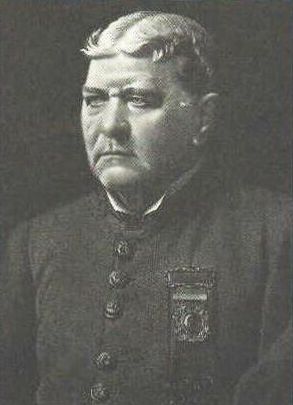Edmund Rucker facts for kids
Quick facts for kids
Edmund Winchester Rucker
|
|
|---|---|

Rucker in 1920
|
|
| Born | July 22, 1835 Murfreesboro, Tennessee, US |
| Died | April 13, 1924 (aged 88) Birmingham, Alabama, US |
| Buried |
Oak Hill Cemetery
|
| Allegiance | |
| Service/ |
|
| Years of service | 1861–1865 |
| Rank |
|
| Unit | Pickett's Company, Sappers & Miners 1st Tennessee Heavy Artillery |
| Commands held |
|
| Battles/wars | American Civil War |
| Memorials | Fort Rucker |
| Spouse(s) | Mary Adele Woodfin Mary T. Bentley |
| Other work | surveyor, engineer, railroad president, business owner, banker |
| Signature | |
Edmund Winchester Rucker (born July 22, 1835 – died April 13, 1924) was an officer in the Confederate States Army during the American Civil War. After the war, he became a very successful business leader in Birmingham, Alabama. A place called Fort Rucker in Alabama was named to honor him.
Contents
Early Life and Career
Edmund Rucker was born on July 22, 1835, near Murfreesboro, Tennessee. He was the grandson of General Jesse Winchester, who fought in the American Revolutionary War and the War of 1812.
After getting a basic education, Rucker moved to Nashville, Tennessee in 1853. He started working as a surveyor for railroads. A surveyor measures and maps land. Later, he became an engineer. In the late 1850s, he was the city engineer for Memphis, Tennessee.
Serving in the Civil War
When the American Civil War began, Edmund Rucker joined the Confederate States Army. He started as a private soldier in a special unit called Pickett's Tennessee Company of Sappers and Miners. Sappers and Miners were soldiers who built things like trenches and bridges.
From Private to Colonel
Rucker was sent to Kentucky and quickly became a lieutenant. On May 10, 1862, he was promoted to captain. He led Company C, 1st Tennessee Heavy Artillery. His unit used large cannons during the Battle of Island Number Ten. When the island was captured, he managed to escape. He was praised for his bravery.
Later, Rucker was moved to the cavalry and became a major. He was tasked with making sure people joined the army in East Tennessee. His group became known as the 16th Tennessee Cavalry Battalion. In early 1863, Rucker was promoted to colonel. He was given command of a new unit called the 1st East Tennessee Legion, also known as Rucker's Legion.
Key Battles and Injuries
With his legion, Colonel Rucker fought in several important battles. These included Pegram's Kentucky Raid, the Battle of Chickamauga, and the Chattanooga Campaign.
In February 1864, Rucker was sent to Mississippi. He joined Forrest's Cavalry Corps and led a brigade under General Abraham Buford II. His brigade fought in the battles of Brice's Crossroads and Battle of Tupelo. During the Battle of Tupelo, he was wounded in his arm and leg.
In November, Rucker was made an acting brigadier general. However, this promotion was never officially confirmed by the Confederate Congress. His brigade, which was part of General James R. Chalmers's division, changed over time. He led them in the battles of Franklin and Battle of Nashville.
During the Battle of Nashville, Rucker was wounded again and captured. His left arm had to be amputated. He was held as a prisoner at Johnson's Island in Ohio. General Nathan Bedford Forrest helped arrange a prisoner exchange for him. Rucker was able to rejoin the army before it surrendered in Gainesville, Alabama on May 9, 1865.
Life After the War
After the Civil War ended, Edmund Rucker went back to Memphis. He continued to work in the railroad business, even working with his former commander, Nathan Bedford Forrest.
In 1869, he moved to Alabama to become a superintendent for a railroad company. In the early 1880s, Rucker settled in Birmingham, Alabama. He built his home in an area now known as Five Points. He worked with another former general, Joseph E. Johnston. Rucker became a very successful business leader, dealing with coal, steel, sales, and land. He also worked in banking.
Rucker was married twice. First, he married Mary Adele Woodfin in 1873. After she passed away in 1883, he married Mary T. Bentley in 1886. He had one son and three daughters with his first wife.
Edmund Rucker passed away on April 24, 1924. He was buried at Oak Hill Cemetery in Birmingham.
Legacy
Fort Rucker, a United States Army post in Alabama, is named in his honor. Also, a chapter of the United Daughters of the Confederacy organization was named after him: the Gen. Edmond Winchester Rucker Chapter 2534.
 | DeHart Hubbard |
 | Wilma Rudolph |
 | Jesse Owens |
 | Jackie Joyner-Kersee |
 | Major Taylor |

